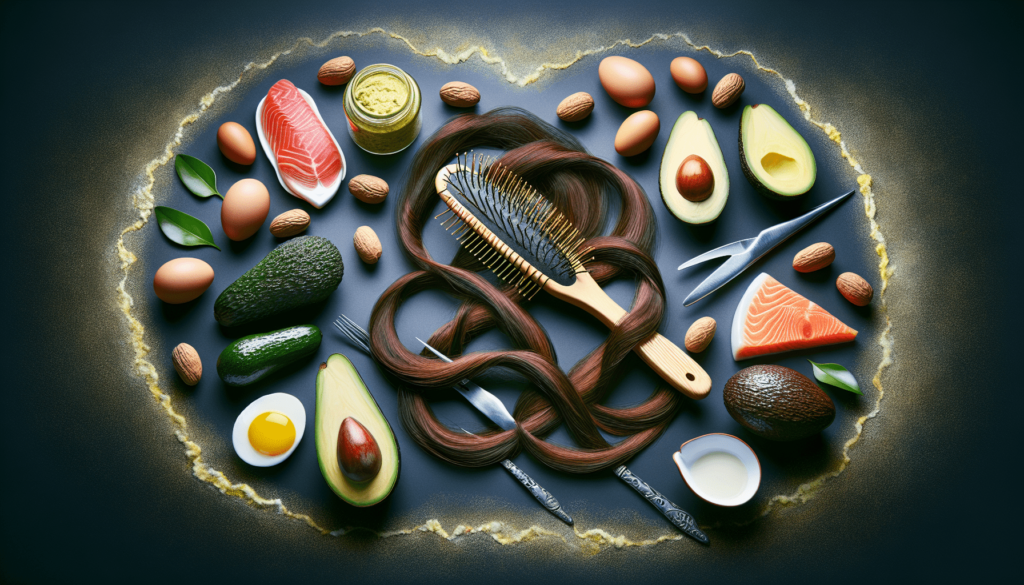Have you recently started following a keto diet and noticed some hair loss? Don’t panic just yet! In this article, we will address the common concern of whether or not the keto diet can cause hair loss. While the keto diet has gained popularity for its potential weight loss benefits, some individuals have experienced hair loss as a side effect. However, we will explore the underlying reasons behind this issue and provide you with helpful tips to mitigate hair loss while maintaining a keto lifestyle. So, if you’re worried about your hair and want to continue on your keto journey, keep reading to find out more!
Understanding the Keto Diet
The keto diet, short for ketogenic diet, is a low-carbohydrate, high-fat diet that has gained popularity in recent years. The main principle of the keto diet involves reducing your carbohydrate intake and replacing it with fats, putting your body into a state of ketosis. In ketosis, your body starts burning fat for energy instead of carbohydrates.
Explanation of the keto diet
The keto diet involves drastically reducing your carbohydrate intake and increasing your fat intake. This reduction in carbohydrates forces your body to enter a metabolic state called ketosis. In ketosis, your body starts utilizing fat as its primary source of fuel, leading to weight loss. The keto diet is often used for weight loss, improved mental clarity, increased energy levels, and better blood sugar control.
Brief history and popularity of the diet
Although the keto diet has gained significant attention in recent years, it has been around for quite some time. It was originally developed in the 1920s as a therapeutic diet for patients with epilepsy. In recent years, it has gained popularity for its potential weight loss benefits. Many individuals have turned to the keto diet as a way to shed excess pounds and improve their overall health.
Overview of the main principles
The main principles of the keto diet involve drastically reducing your carbohydrate intake and increasing your fat intake. Typically, the macronutrient breakdown of a standard keto diet is around 70-75% fat, 20-25% protein, and only 5-10% carbohydrates. By minimizing your carbohydrate intake, your body is forced to burn fat for fuel instead of glucose. This can lead to significant weight loss and other health benefits associated with the keto diet.
Hair Loss: Causes and Common Factors
Hair loss is a common concern for many individuals, and there are several factors that can contribute to this issue. Understanding the causes and common factors associated with hair loss can help you better address and manage the problem.
Overview of common causes of hair loss
Hair loss can be caused by a variety of factors, including genetics, hormonal changes, medication, and certain medical conditions. The most common cause of hair loss is called androgenetic alopecia, or male/female pattern baldness, which is hereditary. Other causes of hair loss include telogen effluvium (stress-related hair loss), alopecia areata (autoimmune condition), and nutritional deficiencies.
Factors that contribute to hair loss
In addition to the common causes of hair loss mentioned above, there are several factors that can contribute to hair loss. These factors include age, gender, certain medical conditions (such as thyroid disease), certain medications (such as chemotherapy drugs), and poor nutrition. It is important to address these factors and make necessary lifestyle changes to promote healthy hair growth.
Genetics and hair loss
Genetics play a significant role in hair loss. If you have a family history of hair loss, particularly in your immediate family, it increases your chances of experiencing hair loss yourself. While you cannot change your genetics, there are ways to manage and minimize the impact of genetic hair loss, such as through medical treatments or lifestyle changes.

Nutritional Deficiencies and Hair Loss
Proper nutrition is essential for overall health, including healthy hair growth. When your body lacks certain nutrients, it can lead to hair loss. Understanding the connection between nutritional deficiencies and hair loss is crucial for maintaining a healthy head of hair.
Hair loss as a result of poor nutrition
A poor diet lacking in essential nutrients can contribute to hair loss. When your body does not receive adequate amounts of key nutrients, it may prioritize other bodily functions over hair growth. This can result in hair loss or thinning. It is important to pay attention to your diet and ensure that you are getting the necessary nutrients for healthy hair.
The importance of a well-balanced diet for healthy hair
A well-balanced diet is crucial for healthy hair growth. It should include a variety of nutrients, such as protein, vitamins (particularly vitamins A, C, D, and E), minerals (such as iron and zinc), and omega-3 fatty acids. These nutrients play a vital role in maintaining the health of your hair follicles and promoting hair growth.
Key nutrients for hair health
Certain nutrients are especially important for maintaining healthy hair. Protein is essential for building and repairing tissues, including the hair follicles. Iron helps your body produce hemoglobin, which carries oxygen to the hair follicles. Omega-3 fatty acids are anti-inflammatory and can help improve hair density and reduce hair loss. Additionally, vitamins A, C, D, and E play various roles in promoting hair growth and maintaining scalp health.
Keto Diet and Nutritional Imbalances
While the keto diet has many potential health benefits, it can also lead to nutritional imbalances if not followed correctly. These imbalances can affect the health of your hair and potentially contribute to hair loss.
How the keto diet can lead to nutritional deficiencies
The keto diet severely restricts carbohydrate intake, which can limit your consumption of certain nutrient-rich foods. Carbohydrate-rich foods, such as fruits, legumes, and whole grains, provide essential vitamins, minerals, and fiber. By significantly reducing these foods, you may be at risk of nutrient deficiencies. It is important to be mindful of your nutrient intake and consider supplementation if needed.
Restrictions of the keto diet and potential impact on hair health
The restrictive nature of the keto diet can potentially impact hair health due to limited variety in food choices. It may be challenging to obtain a wide range of nutrients required for healthy hair growth while strictly following the keto diet. Additionally, some individuals may experience temporary hair loss due to the drastic changes and stress on the body during the initial stages of ketosis.

Impact of Rapid Weight Loss on Hair
Rapid weight loss, often associated with the keto diet, can have implications for hair health. Understanding the potential link between rapid weight loss and hair loss is important for individuals pursuing weight loss through the keto diet.
Association between rapid weight loss and hair loss
Rapid weight loss can be a stressful experience for the body, potentially leading to hair loss. When your body undergoes significant changes, such as a sudden reduction in calorie intake or a shift into ketosis, it can disrupt the hair growth cycle. This disruption can result in increased hair shedding or temporary hair loss.
Possible reasons for hair loss during weight loss
There are several possible reasons for hair loss during weight loss. One reason is the nutritional deficiencies that can occur when restricting calories or specific food groups. Additionally, changes in hormone levels, stress on the body, and overall nutrient imbalances can contribute to hair loss during weight loss.
Other factors that can cause hair loss
Aside from weight loss, there are other factors that can contribute to hair loss. These include hormonal imbalances, certain medications, medical conditions, scalp infections, and excessive styling or hair treatments. It is important to consider these factors when experiencing hair loss and consult with a healthcare professional for an accurate diagnosis.
Stress and Hair Loss
Stress can have a significant impact on your overall health, including the health of your hair. The keto diet, while beneficial for many individuals, can potentially contribute to stress levels, which in turn can affect hair health.
Effects of stress on hair health
Stress can disrupt the natural hair growth cycle and lead to hair loss. When you are stressed, hormones are released that can trigger hair follicles to enter a dormant stage. This can result in increased hair shedding or a delay in hair growth. Chronic or prolonged stress can have a negative impact on hair health.
How the keto diet can potentially contribute to stress levels
The keto diet may potentially contribute to stress levels due to its restrictive nature. Following a strict eating plan, especially during the initial stages of adapting to ketosis, can be challenging and potentially induce stress. It is important to find a balance and practice stress management techniques while on the keto diet.
Stress management techniques
To manage stress while on the keto diet, it is important to incorporate stress management techniques. Some effective techniques include regular physical exercise, meditation or mindfulness practices, breathing exercises, adequate sleep, and engaging in activities that promote relaxation and positive well-being.

Addressing Hair Loss on the Keto Diet
If you are experiencing hair loss while on the keto diet, it is essential to consult a healthcare professional for individualized advice. They can help determine the underlying cause of your hair loss and provide appropriate recommendations.
Consulting a healthcare professional for individual advice
It is crucial to seek professional guidance when experiencing hair loss on the keto diet. A healthcare professional can evaluate your overall health, nutrient intake, and any potential contributing factors to your hair loss. They can provide personalized recommendations to address the issue effectively.
Supplements and vitamins to support hair health on keto
Supplementation may be necessary to support hair health on the keto diet. A healthcare professional can recommend specific supplements that can help bridge any nutritional gaps and promote healthy hair growth. These may include biotin, vitamin D, omega-3 fatty acids, and other targeted supplements for hair health.
Promoting hair growth through lifestyle changes
In addition to addressing any nutrient deficiencies or imbalances, certain lifestyle changes can promote hair growth. These include reducing stress levels, practicing a healthy hair care routine, avoiding harsh styling techniques or chemicals, and protecting your hair from damage. Creating a healthy and supportive environment for your hair can aid in its growth and overall health.
Tips for Maintaining Healthy Hair on Keto
While following the keto diet, it is important to prioritize overall health, including the health of your hair. By implementing certain strategies and being mindful of your nutrient intake, you can maintain healthy hair even on a low-carbohydrate diet.
Eating a well-rounded diet while on keto
To maintain healthy hair on the keto diet, it is crucial to focus on a well-rounded diet. This includes incorporating a variety of low-carbohydrate, nutrient-dense foods such as leafy greens, nuts and seeds, avocados, fatty fish, and high-quality sources of protein. These foods provide essential nutrients for hair health.
Incorporating hair-friendly foods into your meal plan
Certain foods are particularly beneficial for promoting hair health. These include foods rich in biotin (such as eggs and organ meats), vitamin D (fatty fish and fortified dairy products), iron (red meat and leafy greens), and omega-3 fatty acids (fatty fish and flaxseeds). Including these foods in your keto meal plan can support healthy hair growth.
Proper hair care and maintenance
Taking care of your hair is essential for maintaining its health, regardless of your diet. This includes proper washing and conditioning, avoiding excessive heat and styling damage, and using products suitable for your hair type. Regular trims can also help prevent split ends and maintain the overall appearance of your hair.

Optimizing the Benefits of the Keto Diet
While it is important to prioritize hair health, it is also crucial to optimize and balance the other health benefits associated with the keto diet. Finding a sustainable approach to the keto lifestyle and weighing the potential risks and benefits is key.
Balancing hair health with other health benefits of the keto diet
Achieving a balance between hair health and other health benefits of the keto diet is essential. While some individuals may experience temporary hair loss or changes during the initial stages of ketosis, the potential benefits of the keto diet, such as weight loss and improved blood sugar control, can positively impact overall health.
Finding a sustainable approach to the keto lifestyle
Maintaining a sustainable approach to the keto lifestyle is crucial for long-term success. This includes adequately nourishing your body, seeking professional guidance if needed, monitoring your nutrient intake, and listening to your body’s cues. Making adjustments as necessary to ensure overall health and well-being is essential.
Individual experiences with hair loss on keto
It is important to recognize that individual experiences with hair loss on the keto diet can vary. Some individuals may notice minimal changes in hair health, while others may experience more significant hair loss. By being proactive and seeking professional advice, you can address the issue and make necessary adjustments to support hair health.
Final Thoughts and Recommendations
While the keto diet can have numerous health benefits, it is crucial to acknowledge the potential risk of hair loss and prioritize overall health and well-being. It is recommended to consult a healthcare professional before starting any new diet or making significant changes to your eating habits. Additionally, considering alternative diets or modifications to the keto diet may be necessary for individuals experiencing hair loss or other adverse effects. Ultimately, finding a diet and lifestyle that suits your individual needs is key to achieving optimal health and promoting healthy hair growth.

